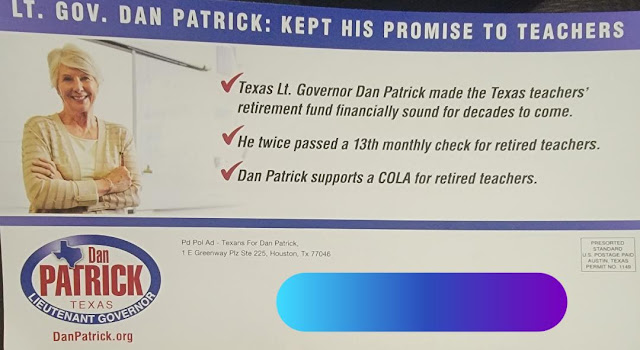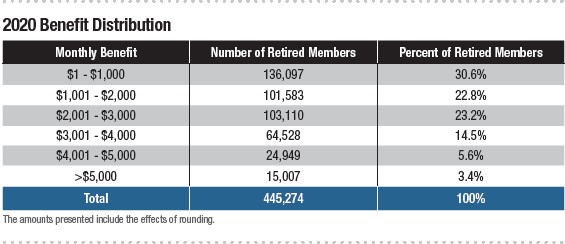I can’t
begin to tell you the number of times I have heard local elected officials and,
especially, state and federal legislators and candidates say, “Educators/Teachers
don’t vote.”
First, let’s
be clear. There is still far too much confusion over the word “educators” and the
idea of “public-ed employees/retirees.” Neither
are “teachers only.” Educators and
public-ed employees/retirees refer to all of our colleagues we
work(ed) alongside of each day. They are our bus drivers, cafeteria staff,
librarians, school nurses, custodians, counselors, classroom aides, office
staff, maintenance staff, police officers, sign-language interpreters,
administrators, and everyone else who devoted their careers to our public-school
system.
All
of us are members of TRS of Texas, which is our pension fund—OUR Social
Security--because we do not have the option of paying into Social Security
while we’re working in Texas public schools. The initialism TRS stands for “TEACHER”
Retirement System, but as I have said repeatedly, that is a misnomer our state
legislators should have fixed long ago. It leaves out a large part of the System’s
members who are/were not teachers, all of those I listed above.
Let’s
return to the “Do educators vote?” question again. What I have been told time
and again is that the reason our affordable health care was stripped from us
during the 2017 Texas Legislative Session and TRS retirees have not had a
single COLA (cost-of-living adjustment) in 18 years is because “educators don’t
vote.”
If you are an
educator—current or retired—DO YOU??
The last TRS retirees to receive a COLA were those who retired on or before August 31, 2004. Look at the COLAs Social Security recipients have received since then (under the red line):
In January, they will be receiving an 8.7% COLA. Those of us who retired on or after September 1, 2004, will be receiving the exact same check we have received since we retired. Despite the historic rate of inflation. Despite the huge hit we took on our health insurance after that 2017 Legislative Session. Despite a $1500 deductible with no co-pay on medical care and prescriptions. Despite it all. Not one COLA.
I ask
again: If you are a current or retired
educator, do you vote? Have you voted
yet?
There are
so many state and federal races on the ballot that have a DIRECT impact on our
health care, our pensions, AND our schools. When you don’t vote, candidates and
current elected officials see that, and many decide they do not have to do
anything to improve our situation because…well…we don’t vote!
At the end
of this post, you will find information on everyone running for state office
and his/her record on supporting public education and public educators.
But one race I boldly ask you to
run to the pools for is the race for lt. governor. Our current lt. governor, Dan
Patrick, is over the Texas Senate, and that body has been the primary one that
has caused us to have such inferior health care and NO COLA IN 18 YEARS!
Look at Patrick’s
recent mailer:
 |
JUST SAY NO! |
With him, Politifact is a MUST! See what this fact-checking website reports about Patrick’s teacher-pay-raise claims.
See how Texas fares—in 2022—on per-pupil funding.
Notice he claims to have done all of this, as if he IS the Texas Legislature. Is that how it works? Are the decisions made really just a one-man vote?
Note there is NO mention of all of the other groups who make up “educators.” Why does he never mention our bus drivers, cafeteria staff, librarians, school nurses, custodians, counselors, classroom aides, office staff, maintenance staff, police officers, sign-language interpreters, administrators? Nor does he mention the amount of Texas retired educators’ monthly pension checks.
This
is why:
Source: A Great
Value for Texans, a TRS publication (The next edition will be
published for the 2023 Legislative Session)
October 20, Patrick posted this on his Twitter feed:
Roughly five days later, I received the mailer posted above
from his campaign. So which is it, Lt.
Governor? Are you promising another 13th
check OR are you promising an 18-years-in-waiting COLA? I read it that we can expect BOTH since that’s
what Patrick seems to be promising. (And, by the way, educators KNOW you cannot
make a 13th check permanent as decisions cannot be made now for future
Texas legislatures—unless they become law.
Educators—do
you vote? PLEASE say yes.
Before you go to vote, study all of
the candidates carefully and go on their RECORDS, not on their (often-unkept) PROMISES.
For this one race—for lt.
governor—I beg you to vote for Mike Collier.
We cannot afford any more broken promises! Our homes, our health, and our well-being
depend on it!
And when
you vote, PLEASE post your picture or a picture of the “I voted” sticker with
the hashtag #educatorsvote on your social media. I voted on the first day, last
Monday, and proudly posted #educatorsvote on my Facebook and Twitter accounts.
When our elected officials start SEEING we vote, things will change.
NOTE: To see how all statewide candidates have been rated by Texans for Public Education, go here. You can see the simple ratings (Friendly, Neutral, or Unfriendly toward public education) or the full ratings, which include all of the data collected for members to study before voting on the ratings.
THE LAST DAY TO VOTE EARLY IS THIS FRIDAY! ELECTION DAY IS NEXT TUESDAY, NOVEMBER 8.
Chris Ardis retired in May of 2013 following a 29-year teaching career. She now works as a freelance writer and editor and is committed to education, educators, and students. Chris can be reached at cardis1022@aol.com. (Photo by Linda Blackwell, McAllen.)










